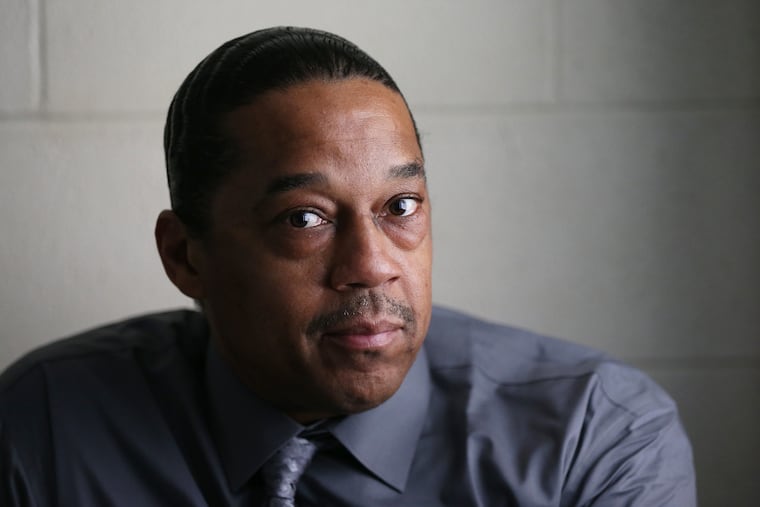New Jersey might give 80,000 people on probation and parole the right to vote. Advocates want more.
A bill to change New Jersey's system is moving quickly through the legislature.

It was Election Day last year. The big midterm elections.
A group of kids, dressed in yellow, stood outside the campus library and asked everyone walking by: Did you vote? Don’t forget!
Antonne Henshaw didn’t know what to say. Nor did the friend walking with him. So they lied.
“I remember feeling such shame that we had to lie to them,” he said. “We were like, ‘Yeah, we voted,’ but we knew we could never vote.”
Even though Henshaw is a graduate student at Rutgers-Camden, and even though he is not considered a public safety threat, he will be on parole for life after spending 30 years behind bars for fatally shooting a man during a dispute.
New Jersey does not allow the more than 80,000 people on probation or parole for felonies — people who are not incarcerated — to vote. It’s not like in Pennsylvania, where voting rights are revoked only while in prison. (Nor is it like states such as Delaware, where restoration of voting rights requires additional action after finishing probation or parole.)
“Exactly what are we afraid of? That people are going to vote?” said Juan Cartagena, president of the civil rights group LatinoJustice PRLDEF. “Oh my god, that’s supposed to be some scary proposition?”
Now the New Jersey Legislature is poised to change that. A bill to limit disenfranchisement to those in prison passed the Assembly this month and cleared a Senate committee Thursday. It is expected to pass in the Senate with backing from Democrats who control both chambers. Gov. Phil Murphy, a Democrat, has stated his support for the idea.
» READ MORE: This New Jersey law is blocking African Americans from voting in shocking numbers
“I’m feeling like I belong, like I’m no longer pushed to the margins,” Henshaw said after the vote Thursday. “I matter. I can have a say in what happens to me now.”
But Henshaw and other advocates said the fight wasn’t over, because people in prison will remain unable to cast ballots. That’s an unfair theft of a fundamental right, they said.
“We’ll start the next battle of the campaign after this gets passed,” said Ron Pierce, on parole after serving 30 years for murder. “It’s just going to take a little more time. … I’m not going anywhere.”
What the bill changes
New Jersey is one of 21 states where people convicted of a felony lose voting rights for the entirety of their sentence but can automatically vote when it ends. (Some states require a judge or a governor to sign off on restoring voting rights.)
The bill, A5823, would move New Jersey to the kind of system used in Pennsylvania, 15 other states, and Washington, D.C.: People lose the right to vote only while incarcerated.
That means people would be allowed to vote while on probation or parole, both forms of supervision that occur instead of or after a prison term.
“Folks who have been disenfranchised have served their time and are taxpayers at this point,” said Assemblywoman Shavonda Sumter (D., Passaic), a primary sponsor of the bill. “Having that right to vote should be granted to them.”
About 102,000 people can’t vote in New Jersey due to felony convictions; about 82,000 are on probation or parole. The proposal would restore voting rights to those 82,000.
Why that matters
Advocates for voting-rights restoration say that democratic participation shouldn’t be connected to the criminal justice system and that removing the right to vote doesn’t match any philosophical goals of that system.
“In a democracy, everyone should have a voice,” said Henal Patel, a lawyer at the Newark-based New Jersey Institute for Social Justice, a nonprofit that led the voting-rights restoration campaign. “Tying the criminal justice system to the electorate makes no sense, and, if anything, undermines the purpose of why we have a criminal justice system.”
For example, it does not appear to deter future crime or rehabilitate people.
Instead, research shows people who are returned to society have higher success rates when they reintegrate more fully and feel more connected to the community. Allowing people to vote could reduce recidivism rates.
The criminal justice system is also highly racialized, and advocates say that unfairly biases eligible voters: White people make up two-thirds of New Jersey’s population but 21% of inmates.
Taking the right to vote away from people with felony convictions is “the most effective form of race-based voter suppression,” Rutgers law professor Penny Venetis said at Thursday’s hearing.
Disproportionately preventing people of color and poor people from voting affects representation and policy-making, advocates said.
“When we talk about policy, we’re talking about real people’s lives and the impact on them and their family members,” said Alexander Shalom of the ACLU of New Jersey.
» READ MORE: How ‘prison gerrymandering’ shifts political power from urban Pennsylvanians of color to white, rural ones
What comes next
The bill passed the Assembly last month along party lines. After hearing testimony from advocates, the Senate Community and Urban Affairs Committee on Thursday approved the bill.
If it passes the full Senate and is signed by the governor, advocates say, they’ll begin working on their next goal: allowing people to vote even while in prison.
“We’re acknowledging that historically this policy is rooted in deep racism, and we’re saying, ‘OK, so let’s get rid of 70% of it'?” said Shalom. “That’s not traditionally how we deal with eradicating the evils of racism.”